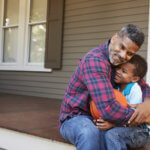Podcast: Download
Subscribe: RSS
Guest post by Robert Luidens
Note from Karen: this wisdom was shared with me by Robert Luidens, a pastor with the Reformed Church of America. Bob recounts a day many years ago, when he met Janelle, a woman whose 10- year-old daughter had died suddenly after contracting a blood infection.
I did not personally know Janelle at the time of her daughter’s death. However, my daughter had come to know the young girl because they attended the same school. So, at my daughter’s request, we attended the girl’s funeral. Over the ensuing months, I heard informal bits and pieces about Janelle and her family from Janelle’s priest and from members of my own congregation. Understandably, reports suggested that both parents were profoundly despondent, but were necessarily pressing on with their life, including caring for their surviving son and daughter.
Through a series of events, a member of my congregation named Brigitte connected me with Janelle. “Janelle is both angry and sad,” my congregant told me. “I’m worried about her.” Janelle had agreed to talk with me, even though we had never met.
On the day that I went to talk with Janelle, she opened the front door to her home, and greeted me. I said, “I appreciate your willingness to invite me into your home, Janelle, considering we’ve not met before.”
“Well,” she said, “Brigitte thought it would be a good idea for me to talk. She said I could say whatever I wanted to you.” So we talked. About everything, from the first indication that her daughter was ill, all the way through to coming home from the post-funeral reception and walking into her daughter’s bedroom, throwing herself onto the empty bed and sobbing.
I listened, my heart aching. Finally, Janelle quietly ended her description of those first terrible days and weeks.
I asked her, “And now. How about you? How are you doing today?”
“OK, Pastor Bob. You asked? Then I’ll tell you. I’m empty. I walk through each day in a dark fog. I try desperately to be there for our son and daughter. My husband, thank God, does far better at that than I.” She stopped. I waited. She continued, “I’m beginning to learn how cruel people can be without their even knowing it. When they think they’re being helpful, they’re not.” She wiped a tear away. It wasn’t a tear of sadness, but of isolation. “They want so much for me to get on with it. To be happy again.”
“How so?”
“They seem to feel that I should be somehow getting over her death.” Silence. “It’s as though they need me to be done with grieving so that they don’t have to grieve with me any longer.”
“That must hurt. Deeply.”
“You have no idea.” I didn’t disagree. Then she said, “May I give you some advice?”
“Of course,” I responded, not sure what was coming.
“Never, ever, tell someone who’s lost a child, ‘Well, your daughter’s in a better place.’” She stopped. I again waited. “Do you realize how incredibly hurtful and insulting that kind of comment is?” I nodded silently. Angrily she said, “My daughter had a wonderful home with us. She had two amazing parents. A loving older brother. An adoring younger sister. A home where she was our light, our joy.” I nodded silently, now feeling her anger myself. “And my friends have the gall to tell me that I can take solace in knowing that my daughter’s in a better place? No! She was where God wanted her to be-here! Not ripped away from us. Not leaving us aching to see her every morning, every afternoon, every night, just so that she can be in some ‘better place’.”
I nodded again.
“And never, ever tell someone who’s lost a child, ‘Well, at least you have two beautiful children still in your home.’” Bitterly she explained, “My best friends, the ones I thought knew me and loved me. They say to me, ‘Janelle, thank God you still have your son and daughter.’ As if they’re meant to fill the emptiness?” She wiped her eyes, and then continued. “Don’t ever, ever tell somebody that they ‘at least’ still have someone else after they’ve lost a loved one.” Now sobbing, she added, “It doesn’t work that way. It doesn’t work that way.”
Our conversation continued. I ended up staying the better part of three hours. There was grief and there was anger. Two souls were bared. No excuses were made. Yet, a bit of salve was felt- by both of us. Though Janelle’s emptiness remained, she was not alone in it.
God would have it no other way.









0 Comments